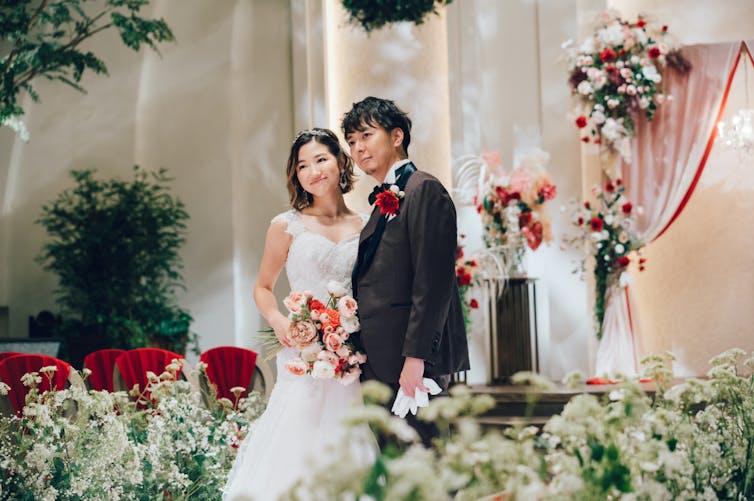
In the recently aired Mexican production of Netflix’s Love is Blind franchise, betrothed couple Chema and Silvia disrupted their producer’s script — and the original premise of the program. The program asks participants to ultimately either get married or break up. But instead, the couple, holding hands and laughing exuberantly like children, did neither — and fled from their wedding guests.
The Mexico Love is Blind (LIB) story is just one example of how the participants in international productions of the popular reality dating show are joyfully disrupting established formulaic narratives.
When international cast members choose to affirm love as independent from matrimony, they demonstrate a subversive non-compliance with the reality dating TV narrative formula. The approach signals a refreshing shift from the painful melodrama of the U.S show, which first aired in 2020 on Netflix and has rolled out six successful seasons. This version values performance over authenticity and spectacle over spared feelings.
Love is Blind
Love is Blind is a serialized reality dating show produced for Netflix that capitalizes on the success of several dating shows before it. In this one, singles pair up and go through an accelerated series of relationship stages: a marriage proposal, a vacation, living together, meeting friends and family. Ultimately, the show culminates in a “will they or won’t they?” wedding ceremony.
The participants spend the first 10 days in isolation, unable to see their potential partners. It’s a gimmick, but the idea is that communication skills, emotions, core values and substance are prioritized over physical attraction.
Couples can only move forward to the seeing each other stage if they become engaged. And all this blind dating is ultimately directed toward matrimony.
But this being a reality TV show, the rapid road to victory, or in this case matrimony, is not a smooth one.
International shows don’t follow the same script
Season 4 of LIB: Brazil also ended with variations of love affirmed but marriage deferred. One couple replied in unison to the officiant: “Not yet!” but vowed that the day was still a “yes to us… and a celebration of love. So now let’s party!”
The United Kingdom’s recent first season featured two couples whose journeys to the altar also concluded with some variation of “not now, but maybe later.”
In contrast, a “no” at the altar in a U.S. production comes with tears, recriminations and bitterness. In the few cases where the dissenting partner has suggested the relationship could continue without a legal contract, they are typically rebuffed. In other words, the American cast takes the show’s premise literally: Say “yes” after five weeks, or walk away forever.
Reality TV formats are routinely traded around the world from a variety of origin countries. Many popular U.S. shows were actually overseas imports. For example, Big Brother was created by Endemol, a Dutch-based media company and American Idol originated in the U.K. as Pop Idol.
While these programs are designed to be adapted internationally with minimal changes to an established narrative format, there is always a degree of cultural specificity at play in the staging of emotions in an international adaptation of any reality TV show.
Love is Blind Japan
The first of the Love is Blind international adaptations was in Japan — notable for its chaste and gentle depiction of courtship.
The cast took the idea of marriage so seriously that they ultimately couldn’t treat it like a “game.” Only two couples of the eight featured in this season made it to the altar — both said yes and remain married today. The others all chose to end the experiment early rather than subject their friends and family to a sham marriage ceremony.

Despite the popularity of the show, there is no second season of LIB: Japan, suggesting that it was ultimately too difficult to bridge the cultural gap in the production process.
The Japan production was a marked departure from the abuse that U.S. cast members have said they are subjected to with “villain edits” or recriminations if they lose control of their online image.
Hints of a toxic workplace?
The political economy of the reality TV dating industry makes it very difficult for cast members to break the established rules of a TV production without penalty.
This is why the behaviour of the cast in some of the international productions is both refreshing and surprising. These cast members have found a way to fulfil their contractual obligations while still preserving their own dignity and not humiliating each other.
It is standard in reality TV for cast members to sign non-disclosure agreements that ensure they don’t speak publicly about their time on the program. This prevents the early release of information which might “spoil” an outcome for viewers before distribution is completed.
Recently, despite the non-disclosure agreements, some U.S. cast members have spoken out about negative experiences and unfair labour practices. There have also been legal charges of abuse against participants. These claims have led to suggestions that the U.S. production has created a toxic workplace. These accusations could have long-term implications for the future of the Love is Blind U.S. series, as well as other reality TV shows.
The fact that U.S. members are speaking out and getting some media attention may be one of the reasons international casts feel emboldened to resist production expectations without fear of penalty. In other cases, an international production team may choose to deviate from the standard script.
That’s entertainment
Recently, the U.K. production has tried to distance itself from these disputes while attempting to attract viewers to the brand with a distinct British style.
The U.K. hosts are also much more hands off with the cast compared to their U.S. counterparts whose intrusive questions are designed to elicit additional drama — a standard approach for U.S.-based reality TV dating shows.
Reality romance shows that end at the altar, like the Love is Blind and Bachelor franchises, promote a pre-determined and idealized view of heterosexual love. Of course, actual reality can’t compete with the fantasy of reality TV, but as the audience numbers demonstrate, the drama that is created by that gap makes for compelling entertainment.
Tiara Sukhan does not work for, consult, own shares in or receive funding from any company or organisation that would benefit from this article, and has disclosed no relevant affiliations beyond their academic appointment.
This article was originally published on The Conversation. Read the original article.







